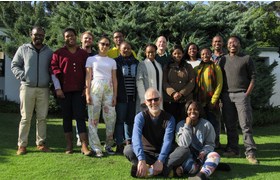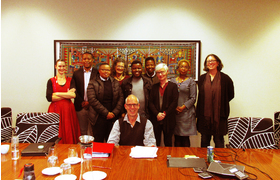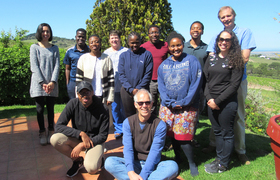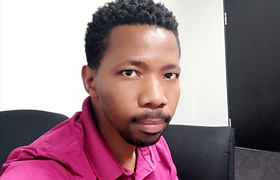Department of Higher Education creates a task team on gender-based violence
22 October 2019 | Story Robert Morrell. Photo Robert Morrell. Read time 3 min.
Gender-based violence and sexual harassment have long been a recognised problem in South Africa. The country boasts notoriously high rape rates, and these have spurred a national agenda of research and public activism over the last two decades. In May Naledi Pandor, then Minister of Higher Education and Training (DHET), appointed a Task Team to advise her on how to help to prevent sexual harassment and sexual violence at universities.
Among those appointed was Dr Robert Morrell, internationally recognised for his gender research, which has included a focus on violence, schooling and masculinities. The other members of the Task Team are Professor Jackie Dugard, Professor Pumla Gqola, Ms Sisipho Palomino Jama, Ms Corinne Knowles, Dr Babalwa Magoqwana, Mr Jerome September and Professor Malehoko Tshoaedi. The Task Team is supported by the university education branch of the Department.
In creating the Task Team Minister Pandor indicated that she remained “concerned about the prevalence of sexual harassment and gender-based harm in our public universities and believe that there is a great deal of work that can be done to improve our understanding of the situation in all our universities; share good practices across the sector; and advise on policy frameworks; minimum basic levels of services for reporting, referrals and support for staff and students; and other mechanisms to reduce sexual harassment and gender-based harm in our universities.”
“Achieving gender equity in South African universities will never be possible if we do not address cultures of sexual harassment that can have a serious effect on the lives and experiences of students and staff at universities, and if we do not pay close attention to the proper implementation and oversight of sexual harassment policies and procedures. The work that we need to do to change academic spaces is urgent and requires a shared effort from government, universities and the communities that they serve”.
Since the establishment of the Task Team, UCT has witnessed the tragic rape and murder of student Uyinene Mrwetyana. This sparked outrage and public protest and underscored how important the work of the Task Team will be.
 This work is licensed under a Creative Commons Attribution-NoDerivatives 4.0 International License.
This work is licensed under a Creative Commons Attribution-NoDerivatives 4.0 International License.
Please view the republishing articles page for more information.
New Generation of Academics Programme (nGAP)
UCT has responded energetically to the New Generation of Academics Programme (nGAP), an opportunity provided by the Department of Higher Education (DHET) to build a new generation of black South African academics. The DHET’s 2015 vision document, “Staffing South Africa’s Universities Framework: A comprehensive, transformative approach to developing future generations of academics and building staff capacity”, proposes a suite of initiatives to address the challenge, with nGAP being the major instrument to increase the numbers of black South African academics.
The programme “involves the recruitment of highly capable scholars as new academics, against carefully designed and balanced equity considerations and in light of the disciplinary areas of greatest need”. The nGAP scholars are appointed into permanent positions where from the outset their conditions are customised to ensure their successful induction into the ranks of established academics.
The DHET provides funding over a six-year period to support the appointment of an nGAP lecturer, and their time is protected to provide the best possible opportunity for the completion of a doctorate degree in the shortest possible time. Once the degree is completed, the nGAP lecturer’s teaching commitments are steadily increased until they shoulder a full teaching load.
Since the first advertisement for nGAP posts in 2015, UCT has been awarded 17 nGAP positions: 5 (Phase 1), 4 (Phase 2), 3 (Phase 3) and 5 (Phase 4). These are distributed across all faculties.
UCT’s nGAP scholars operate as a single cohort, managed and coordinated by Dr Robert Morrell. Lecturers meet for quarterly meetings, writing retreats and various capacity-building activities all designed to support the completion of postgraduate qualifications (particularly doctorates) and to develop records of achievement that will testify to their emergence as self-standing, excellent academics. Each lecturer is mentored by a senior scholar, who provides support and guidance on the challenges that routinely face academics.
The nGAP manager sets great store in building the cohesion of the cohort and encouraging the establishment of new UCT networks while producing a collaborative, mutually supportive and embracing work culture.
According to Dr Morrell, “This group of academics will lead UCT in 15 to 20 years’ time ... Their vision of excellence, of being African and South African, of serving a wider community and producing knowledge for the planet, the continent and the country, will power UCT in years to come.”
Newsletters
In the news









































